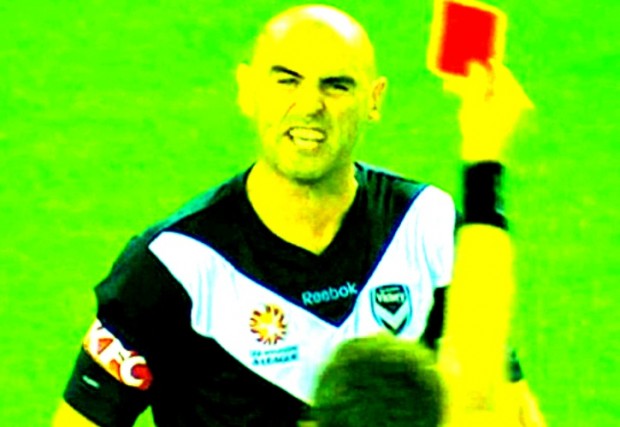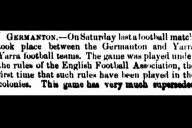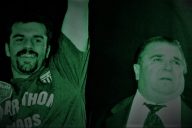Melbourne Victory enjoyed the dizzy, Disney-friendly days of Ange Postecoglou, gilded by the sparkling form of Marco Rojas, last year’s Johnny Warren medallist. But now with Kevin Muscat storming the sidelines, after Ange skipped town for the Socceroos, things have changed at AAMI Park. Luke Dodemaide writes.
Muscat’s hands are in his pockets. As Rashid Mahazi comes off in the 71st minute, one of a cluster of Melbourne Victory players caught napping on two occasions by the Newcastle Jets’ brace-scoring Nathan Burns, you pray those hands aren’t forming fists.
“Good job,” Muscat offers. Mahazi breathes a sigh of relief. The slap his coach put onto his head will barely leave a bruise.
And this is the mark Muscat is leaving on the Victory as the uncompromising, question-me-if-you-dare replacement for the universally praised — and now nationally adopted — Ange Postecoglou.
During Muscat’s three-year stint as Victory No. 2 — waiting behind Ernie Merrick for a year after his retirement from playing, then Mehmet Durakovic and Jim Magilton for a few months more, before settling in for 18 months behind Postecoglou — he always looked like a man who couldn’t quite seize his Brutus moment.
Outkick, Outlast, Outplay
Muscat’s personality is anything but ‘type 2’ and he appeared odd pumping his fists in an assistant’s tracksuit pants. Eventually, however, as Postecoglou relieved Holger Osieck of his job as Socceroos coach, the Victory’s hand was almost forced to gift the job to the biding Muscat. Because, if not this year, and this opportunity, then when? The Victory couldn’t possibly overlook him and expect him to sit on the sidelines any longer.
So Muscat, as a two-time grand final-winning player, inaugural captain and legend of the club, had won a Survivor-like game to earn the job. Now in his seventh week in charge, the Australian football public will see Muscat’s Victory in Friday night’s free-to-air timeslot up against the Perth Glory. Most of them, however, will not be rooting for Muscat’s men. And they have their reasons.
Muscat is a tough character. As a player, he was the reckless biker of Australian football, who will no easier run over an opponent’s knee (see Adrian Zahra, whose career he almost ruined and who is now turning out for Glory) than a coach’s plastic chair (see John Kosmina, who may now be relegated to the status of the second most fiery A-League coach of all time) all to achieve… what?
Careless and callous — and once dubbed “probably the most hated man in football” by then Birmingham City manager Martin Grainger for a crude tackle on then fellow Socceroo Stan Lazaridis — Muscat has had plenty picketing for his head.
Ruthless Victor
In Melbourne at the moment, Muscat is both Melbourne Heart’s pointed example of all that is wrong with Melbourne Victory (ruthless, whiners) and the Victory’s example of all Heart are not (ruthless, winners).
While Heart coach John Aloisi may be the face of Australia’s drought-breaking World Cup qualification, it could have easily been that of Muscat: whose first-leg penalty at the MCG in 2001 granted Australia a 1-0 win and an advantage heading to Montevideo, Uruguay. Save for a few things (defensive lapses in the Montevideo return leg; Dario Silva in the 14th minute, Richard Morales in the 70th and 90th), Muscat’s penalty could have been the one with the feel-good elements Aloisi’s now enjoys.
Some people might say it was worth waiting those four years. Others would just take success no matter the cost — one of which is Muscat himself.
Muscat, the coach, has been on his best behaviour. He has not rushed from the Victory bench yet, staring someone down with those bottom-of-the-ocean blue eyes. But surely that will come.
His Victory fashion an exciting, attacking game. He has inherited an inventive line-up from Ange Postecoglou and hasn’t impeded at all upon its ‘false 9’ set-up nor attacking bent.
James Troisi, jointly owned by Serie A outfits Juventus and Atalanta, is proving a Johnny Warren medal contender (though he too has had his moment with Muscat). And Muscat’s willingness to press on with youth, such as 20-year-old former Brisbane Roar youth player Jason Geria and 20-year-old attacker Connor Pain, despite only one goal from 20 outings, must also be commended.
If there is one clumsy piece in the Victory line-up, it is the marquee tag slapped on the 35-year-old, so far lacklustre, defender Pablo Contreras, who has played in the shadow of captain Mark Milligan, despite a far superior pay packet. Muscat, in all his bastardry, may be the best-qualified man to look Contreras in the eyes and tell him that.
Badness, like anything, has its perks.
The Pressure Game
But, more importantly, just how good is this Victory side? With Postecoglou at the helm, they were vocal about their ‘championship or bust’ mentality. With Muscat, it seems to be more a ‘wait and see’ approach.
Muscat has lost three of his six games in charge, against two wins and one draw, but the club — and its supporters — have so far exuded patience; even sophistication. Melbourne Victory peppered the goal against the Central Coast Mariners for no reward in a nil-all draw — something that must have made Muscat wish he had hair, purely to rip back out. And they fought the Western Sydney Wanderers to a standstill before being denied by a cruel late goal courtesy of Mark Bridge.
Facing Perth Glory at home, in a game they really should (and perhaps must) win, the pressure will now begin to increase on Muscat, who, his playing career aside, is yet to show he can handle it as a manager.
Muscat is not the poster boy Aloisi is, nor the veritable visionary Postecoglou is, but for now — and as perhaps he has always been — he is the Melbourne Victory’s man. And after a rockier than desired start, Contreras, Leijer, Mahazi and co., must learn to protect their goal this weekend — and themselves — for if Brazilian revelation Sidnei strikes this Friday night, so too may their coach.
Perhaps only then, with ears ringing at AAMI Park, will Victory supporters truly be able to ask, “Ange who?”
















